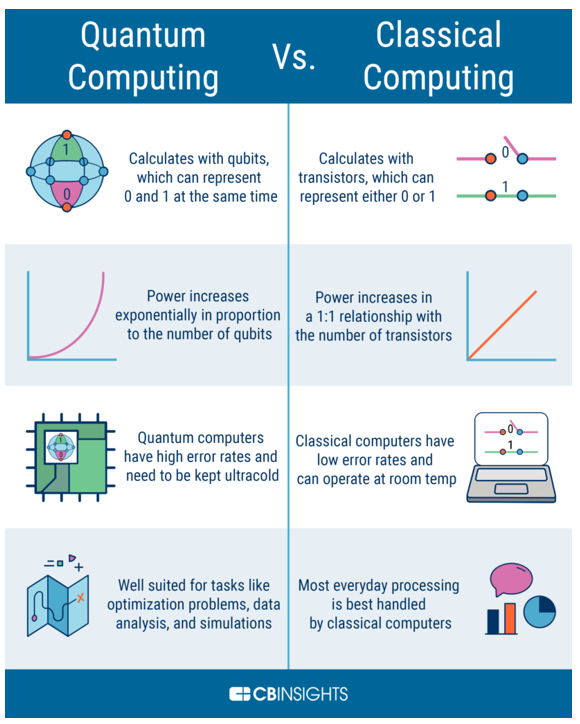This New Tech Is Driving a Quantum Leap in Crypto Security
 |
| By Jurica Dujmovic |
There is a groundbreaking advancement that is just starting to shake up the tech industry. And it has potential to redefine industries, science and the very nature of computation.
But what I’m interested in today is how its rapid development and potential threats have already started a race to redesign and improve blockchain security.
I’m talking about quantum computing.
Unlike traditional computers — which use transistors to process basic information known as “bits” represented as either 0s or 1s — quantum computers use quantum bits, or qubits.
Qubits can exist in multiple states at once, a revolutionary development.

This unique capability allows quantum computers to process a vast array of possibilities simultaneously, drastically accelerating data analysis and problem-solving.
The entanglement of qubits further enhances this ability, enabling instantaneous communication of state information across qubits, regardless of distance. This gives quantum computers their edge in speed and computational power.
But as I said, what I’m particularly excited about are the implications quantum computing has for cybersecurity, particularly in the realm of cryptocurrencies.
See, while quantum computing holds incredible potential for innovative advancement in fields like drug discovery, material science and machine learning, it can also pose a significant risk to the broad crypto ecosystem.
That’s because cryptos like Bitcoin (BTC, “A”) and Ethereum (ETH, “B+”) rely heavily on cryptographic algorithms to secure transactions and user assets.
And quantum computing's ability to solve complex mathematical problems could theoretically break these cryptographic defenses, posing a significant threat to the security and integrity of blockchain networks.
As such, the race is on to develop quantum-resistant cryptographic algorithms to safeguard the future of digital assets.
With the National Institute of Standards and Technology actively working to standardize post-quantum cryptography by 2024, the crypto community is poised at a crucial juncture. It must balance the promising horizons of quantum computing ... and the urgent need to fortify its cryptographic defenses against this emerging quantum threat.
Those defenses are predominantly based on public-key cryptography and hash functions — complex math problems used to validate blocks on proof-of-work networks like Bitcoin. However, these are vulnerable to two specific quantum algorithms: Shor's Algorithm and Grover's Algorithm.
Shor’s Algorithm could theoretically break the public-key cryptographic systems by determining private keys from public keys, a foundational aspect of blockchain security.
Grover's Algorithm, on the other hand, could potentially cut the time required to brake hash functions in half.
There's ongoing research and development in creating blockchain systems that can withstand quantum attacks, though many of these are in the early stages or not yet widely adopted.
Some examples are …
- QANplatform (QANX, Not Yet Rated): This blockchain platform is designed to be quantum-resistant from the ground up. It aims to provide fast, secure and scalable blockchain solutions that are protected against quantum computer attacks.
- Mochimo (MCM, Not Yet Rated): This quantum-proof cryptocurrency uses a post-quantum cryptographic algorithm called WOTS+ (Winternitz One-Time Signature Scheme Plus). This makes it resistant to the potential future threats posed by quantum computing. Mochimo aims to be a scalable and secure option for digital transactions, emphasizing its quantum-resistant features as a key differentiator.
- Quantum Resistant Ledger (QRL, Not Yet Rated): It utilizes the eXtended Merkle Signature Scheme (XMSS), a hash-based signature scheme recognized for its quantum resistance, differing fundamentally from ECDSA and thus offering a robust defense against potential quantum computational attacks.
There are also several active crypto projects that are addressing the quantum computing threat. They’ve recognized the potential danger and have started to shift focus to quantum security, including:
- IOTA (IOTA, “C+”): While not solely focused on quantum resistance, IOTA's Tangle technology is designed to be more secure against quantum computing threats compared to traditional blockchain. The project has explored post-quantum cryptographic algorithms to ensure the security of its network in a future where quantum computing is prevalent.
- Cardano (ADA, “B”): The Cardano blockchain has shown interest in enhancing its cryptographic measures to counter quantum threats. While Cardano has not implemented quantum-resistant algorithms yet, the research and development team behind Cardano is actively exploring post-quantum cryptography solutions to safeguard its network against future quantum attacks.
Beyond individual projects, the broader cryptographic community is developing post-quantum cryptographic standards. The U.S. National Institute of Standards and Technology is leading an initiative to standardize quantum-resistant algorithms, which will play a crucial role in protecting the future of all digital assets, including cryptocurrencies.
So, is quantum computing going to be the end of crypto?
I don’t think so.
The crypto space has a history of notable resilience. It’s faced numerous challenges and emerged stronger each time.
This track record of adaptability and innovation provides a solid foundation for optimism as the crypto sector prepares to navigate its next challenge: the quantum computing era.
And as it does, new opportunities unique to this emerging sector will emerge. And savvy, well-informed investors will be ready.
As the crypto world continues to adapt and innovate, it stands ready to turn the quantum threat into another milestone on its path of continuous evolution, ensuring the security and viability of digital assets for the future.
In fact, if this article garners enough attention (you can ensure that by tweeting @WeissCrypto with hashtag #QuantumLeap), next week I’ll talk about how crypto can prosper and profit by harnessing the power of quantum computing!
You won’t want to miss that, so spread the word and tune in next week.
Best,
Jurica Dujmovic

